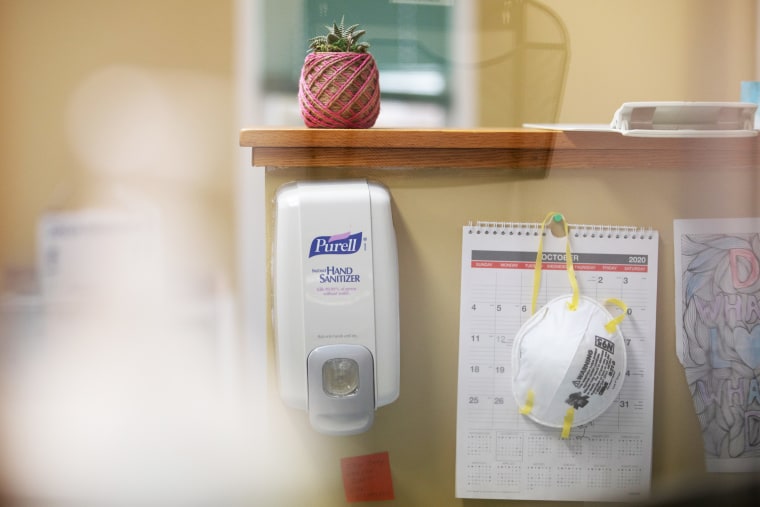Her assertion is backed by the California occupational safety agency, Cal/OSHA, whose rules on protecting at-risk workers from infections might be at odds with the CDC’s if the proposals are adopted. “The CDC must not undermine respiratory protection regulation by making the false and misleading claim that there is no difference in protection” between N95 masks and surgical masks, commented Deborah Gold, an industrial hygienist at Cal/OSHA, at the August meeting.
Researchers and occupational safety experts were also perplexed by how the committee categorized airborne pathogens. A surgical mask, rather than an N95, was suggested as protection for a category they created for “common, endemic” viruses that spread over short distances, and “for which individuals and communities are expected to have some immunity.” Three committee representatives, researchers Hilary Babcock, Erica Shenoy, and Sharon Wright, were among the authors of a June editorial arguing that hospitals should no longer require all health care workers, patients, and visitors to wear masks in hospitals. “The time has come to deimplement policies that are not appropriate for an endemic pathogen,” they wrote.
However, in a call with KFF Health News, Kallen clarified that the committee put coronaviruses that cause colds in that category, but not yet the coronavirus causing Covid.
The committee’s next tier consisted of viruses in a “pandemic-phase,” when the pathogen is new and little immunity through infection or vaccination exists. It recommended that health workers wear an N95 mask when treating patients infected by bugs in this category. Its third, highest tier of protection was reserved for pathogens like those causing measles and tuberculosis, which, they claimed, can spread further than lower-tier threats and require an N95.
Virologists said the committee’s categories hold little water, biologically speaking. A pathogen’s mode of spreading isn’t affected by how common it is; common viruses can still harm vulnerable populations; and many viruses, including SARS-CoV-2, can travel significant distances on microscopic droplets suspended in the air.
“Large COVID outbreaks in prisons and long-term health care facilities have demonstrated that the behavior of infectious aerosols is not easily classified, and these aerosols are not easily confined,” wrote the deputy chief of health at Cal/OSHA, Eric Berg, in a letter of concern to the CDC committee, obtained by KFF Health News.

The committee pitted its assessment of N95 masks against their drawbacks. Its draft cites a study from Singapore in which nearly a third of health care personnel, mostly nurses, said wearing such masks negatively affected their work, causing acne and other problems exacerbated by hot and humid conditions and prolonged shifts. Rather than discard the masks, the authors of that study recommend better-fitting masks and rest breaks.
Noha Aboelata, a doctor and the CEO of Roots Community Health Center in Oakland, California, agrees. “There are other strategies to bring to bear, like improved mask design and better testing,” she said, “if we decide it’s unacceptable to give a patient Covid when they go to the hospital.”
Aboelata is one of hundreds of doctors, researchers, and others who signed a letter to CDC Director Mandy Cohen in July, expressing concern that the CDC committee will weaken protections in hospitals. They also warned that scaling back on N95 masks could have repercussions on emergency stockpiles, rendering doctors and nurses as vulnerable as they were in 2020 when mask shortages fueled infections. More than 3,600 health workers died in the first year of the pandemic in the United States, according to a joint investigation by KFF Health News and The Guardian.
The concerned clinicians hope the committee will reconsider its report in light of additional studies and perspectives before November. Referring to the draft, Rocelyn de Leon-Minch, an industrial hygienist for National Nurses United, said, “If they end up codifying these standards of care, it will have a disastrous impact on patient safety and impact our ability to respond to future health crises.”
KFF Health News, formerly known as Kaiser Health News (KHN), is a national newsroom that produces in-depth journalism about health issues and is one of the core operating programs at KFF — the independent source for health policy research, polling, and journalism.Follow NBC HEALTH on Twitter & Facebook.









Recent Comments